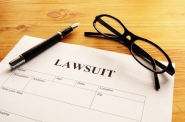 Lawsuits are an unfortunate and inevitable feature of modern business. That goes for institutions and incorporated entities like HOAs as well. While it’s unlikely that an HOA will be able to avoid all lawsuits entirely, there are steps they can take that will at least eliminate some of the possible lawsuits from ever happening.
Lawsuits are an unfortunate and inevitable feature of modern business. That goes for institutions and incorporated entities like HOAs as well. While it’s unlikely that an HOA will be able to avoid all lawsuits entirely, there are steps they can take that will at least eliminate some of the possible lawsuits from ever happening.
Most Common Types of Lawsuits
While there are a variety of reasons that HOAs might be sued, there are a few issues that are the most common causes of lawsuits:
- Breach of covenant – if a resident believes that the HOA is not performing the duties it is responsible for, they can file suit against the HOA for breach of contract
- Breach of fiduciary duty – residents can also sue an HOA and/or its board members for improper handling of community funds. This includes everything from outright fraud and embezzlement, failure to properly maintain a reserve fund to cover repairs or expenses, and even failure to sue/collect damages from contractors who perform substandard repairs or install faulty products.
- Injury/lack of proper maintenance – if a resident is hurt in a common area and believes that their injury was preventable with proper management (i.e., they slip and fall on a patch of ice covered by snow in a common area where snow removal is the association’s responsibility), they can sue the HOA for negligence. Suit can also be filed if common areas are not maintained in a way that is likely to prevent injury.
- Not taking responsibility for employees – HOAs can also be held responsible for the harmful or illegal actions of their employees, if the HOA has failed to take proper action against them. For example, if a maintenance worker is accused of sexually harassing a resident, that resident can sue the HOA if the HOA does not take the actions required by law to protect that resident from the accused harasser.
How to Avoid Lawsuits
The first step an HOA can take to avoid lawsuits is, of course, to make sure that they are following all laws and agreements to their fullest. They should also be sure to consult an attorney or other expert on matters of possible liability, and then follow their advice exactly; liability for some issues is reduced or eliminated if the HOA was acting on the advice of counsel.
Another way to reduce lawsuits is to take steps to reduce tension in the community. Residents are less likely to sue an association if they look at it as a body made up of neighbors who listen to their problems, and not a cold, distant entity that is prone to disregarding their concerns. Holding meetings where residents can discuss issues and air their grievances is one option. Even holding regular neighborhood get-togethers that allow people to interact with board members as other human beings can do wonders for improving the relationship between residents and their HOA.
For more tips and information in the CAM industry follow out blog!